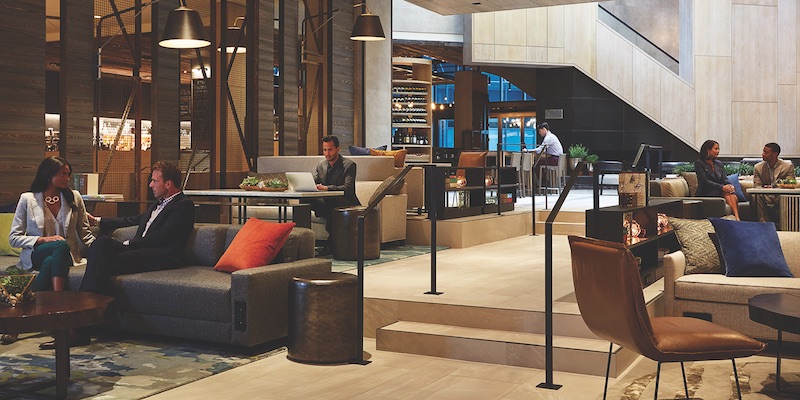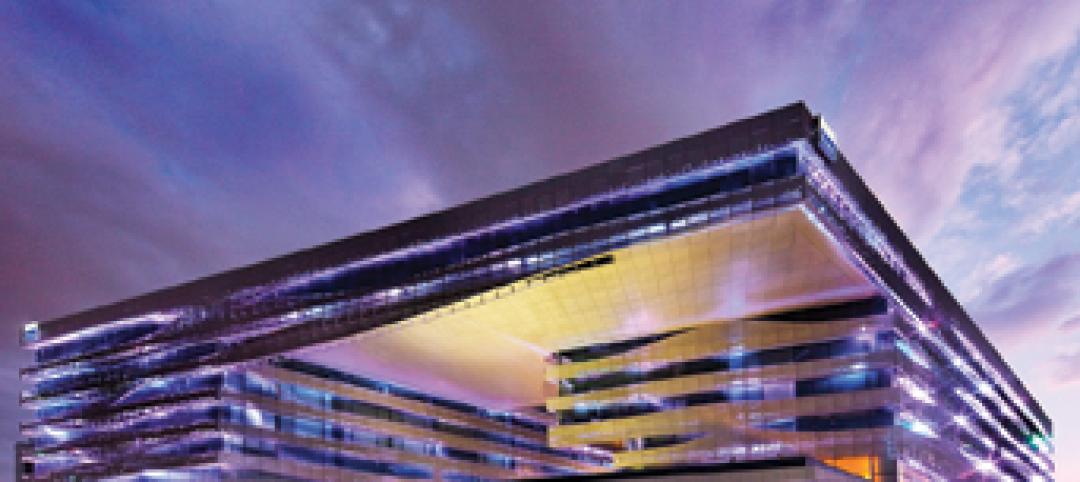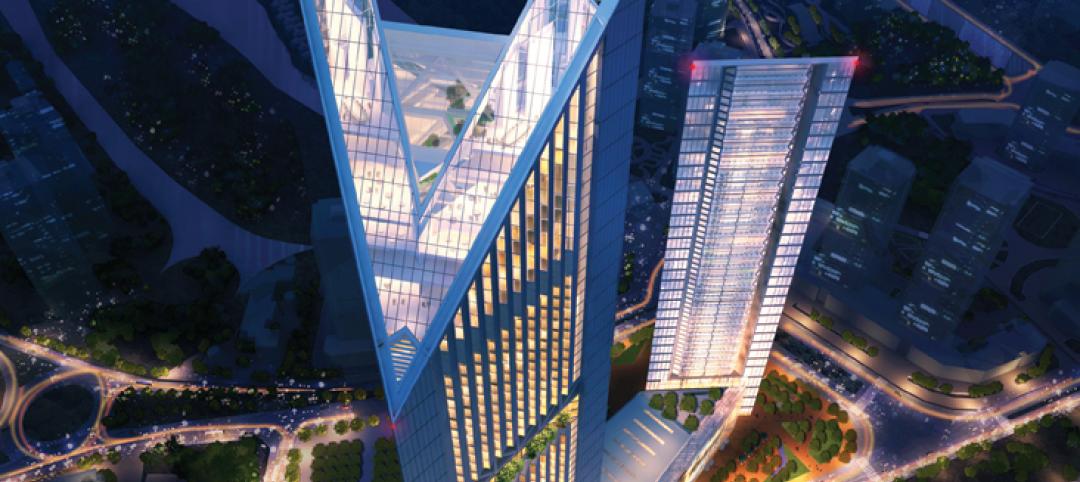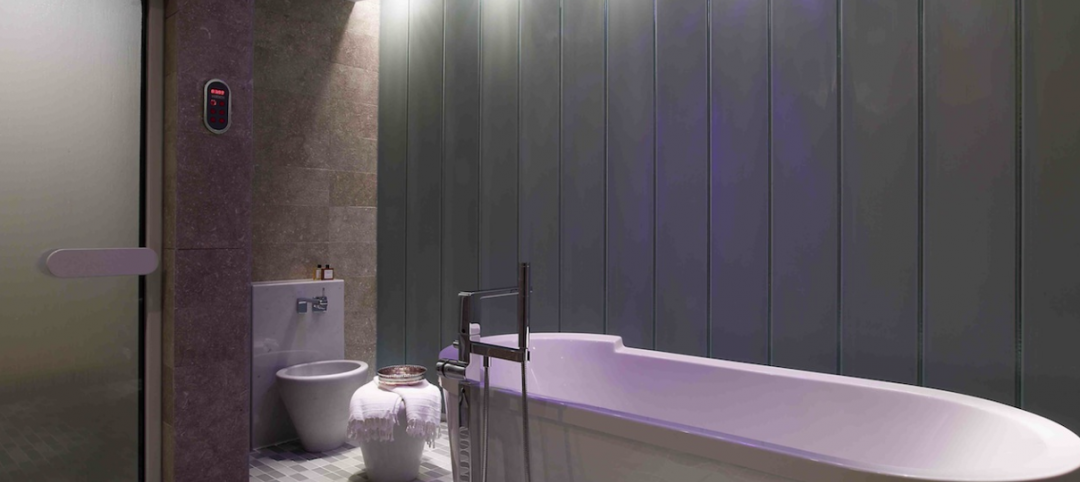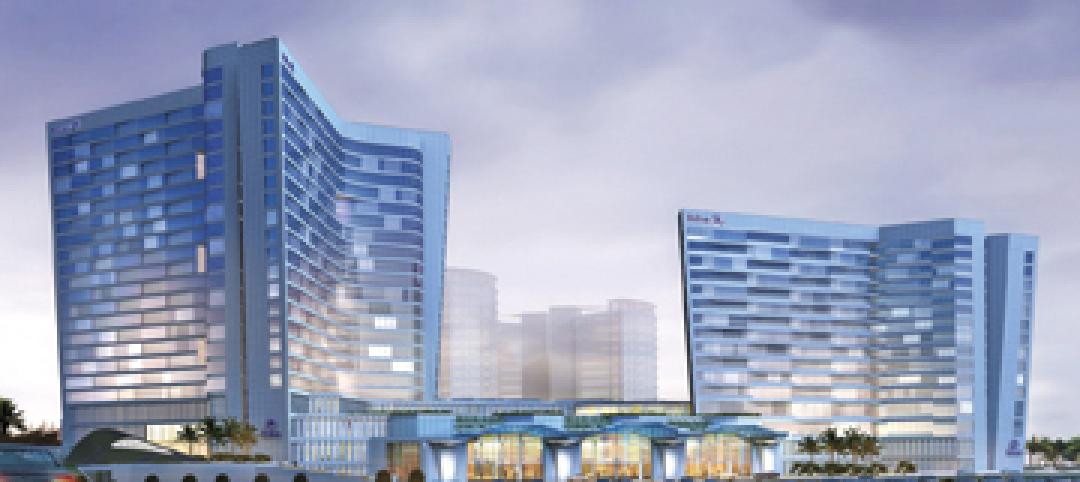Ten years from now, a hotel stay will be a much different experience than today. Picture this: As you approach the property entrance, you see a massive art installation illuminated by an LED light show. You walk through the door to the lobby, bypass the check-in area, and are guided to your room by your smartphone and dynamic digital signage.
Your phone unlocks your door, and as you step into the room, you notice that the temperature has already been set to 71 F—just how you like it. The window blinds are closed, and the lighting level and color temperature adjusts to help you acclimate to a new time zone by resetting your circadian clock.
Hospitality companies are testing an array of such technologies so that over the next half-decade they can personalize your stay, wow you with unique features, and create a distinctive sense of place. Design firms are more involved than ever in researching the possibilities of reshaping the guest experience. Some of the enhancements in next-generation hotels will be inconspicuously embedded into the built environment. Others will be obvious.
Hotel designers must think beyond the bricks and mortar as emerging technologies play a more prominent role in the guest experience. Artificial intelligence, robotics, state-of-the-art video projection, and voice-activated controls are all fodder for new experiential design. Hotel brands will use these technologies to distinguish themselves from competitors.
Of course, there will still be a market for economical places for travelers to spend a night or two, and these properties likely will be slow to adopt new technology. For higher-end hotels and destination resorts, though, there could be a tech arms race in the works.
“A hotel will no longer succeed if it’s just a place to sleep,” says Michael Schneider, Senior Experience Designer and AV Technical Strategist with ESI Design, in New York City. The goal is to provide guests with distinctive moments and memories. “It’s about creating iconic experiences, Instagramable moments,” adds ESI’s Greg Gallimore, the firm’s Director of Media Architecture.
Here are six trends shaping the future of hotels:
1. A/V steps up to create true destination spaces
In what might be a harbinger of the future, ESI designed an interactive LED light sculpture installed in the front plaza of a mixed-use hotel and office property in Washington, D.C. People in proximity to the installation can see their movements reflected in the light. “It has become an iconic part of the community and emphasizes its public nature,” says Gallimore.
The opportunities for A/V technology to enhance experiences at destination resorts are enormous. At a redevelopment of Queen Mary Island in Long Beach, Calif., Gensler is considering features such as drive-through walls of video screens that could project images to whet guests’ appetites for the experiences inside. A/V could be used liberally throughout the Queen Mary property, which is a hotel itself, to inform guests about the history of the ship, sea life, and the state, says Steven Upchurch, AIA, Managing Director, Principal, and Firmwide Hospitality Practice Area Leader with Gensler.
LED and digital image projection technology can be used effectively within a hotel, too. For example, the lobby of the 900 North Michigan Avenue Shops in Chicago features a 4,000-sf ceiling that serves as the screen for a dazzling light and image show of sky, trees, birds, kaleidoscope effects, and other imagery. Interspersed are logos and products—think Gucci handbags, luxury chocolates—of the mall’s retailers. Many guests at the adjoining Four Seasons hotel enter the property through this atrium lobby, so the space functions as a hotel lobby of sorts.
2. TechnologY fosterS hyper-personalized service
Other elements of hotel lobbies may change, though more subtly. For instance, “you won’t see big airline-type check-in counters,” says Shawn Basler, AIA, Principal, Executive Director, and Hospitality Practice Leader with Perkins Eastman. Like airlines that offer check-in before arriving at the airport, hotel guests will be able to check-in prior to arrival if they choose. In luxury hotels, in particular, there will be staff to greet guests as they arrive in the lobby. Equipped with a mobile device, attendants will provide personal service, helping guests to customize their rooms and experience.
That service may be critical, as big hotel companies such as Marriott International, with its Innovation Lab, are testing new electronic products and automated features that enable guests to set the ambience of their rooms. Guests may need an introduction to the technology to get it to work according to their wishes. Sophisticated lighting options, projection video, aroma features, temperature control, smart windows that control the amount of ambient light, and music over Bluetooth speakers could all be managed from guests’ smartphones or in-room control panels. Voice-activated controls such as Alexa and Siri could simplify this activity.
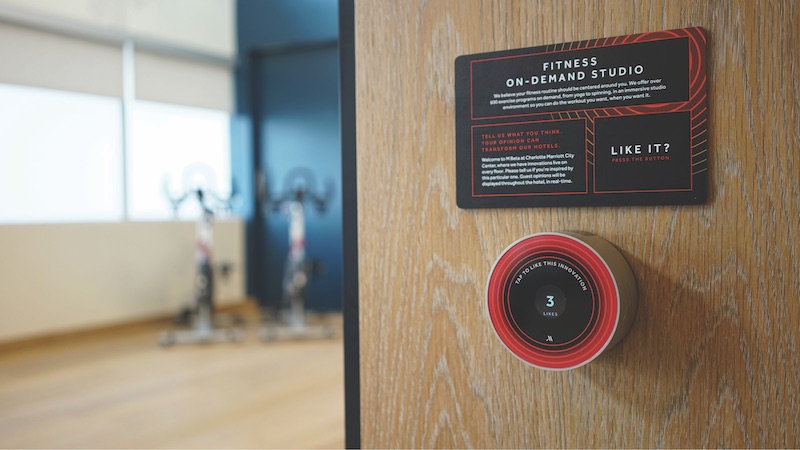 The hotel allows for rapid prototyping and invites guests to test and give feedback in real-time via Beta Buttons (below) located throughout the spaces. Photo: Marriott International.
The hotel allows for rapid prototyping and invites guests to test and give feedback in real-time via Beta Buttons (below) located throughout the spaces. Photo: Marriott International.
3. Lighting is fine-tuned to create “feel good” spaces
Optimizing LED lighting may be critical, as the ongoing transition to this technology still has many confused as to which levels of color temperature and brightness are optimal.
“Most people don’t understand why they feel good in a space,” says Clay Markham, AIA, LEED AP, Senior Vice President and Global Hospitality Leader with CallisonRTKL. “It’s mostly because of lighting.”
Lighting holds promise to relieve jet lag. Researchers are investigating how altering lighting can help people reset circadian rhythms, and hotels are an obvious venue to adopt such features, says Gallimore.
Finding your way around a big hotel or resort may be quite different in a decade or so. You may be able to search for your room by following fiber optic light indicators embedded in the carpet. If you let your phone alert the hotel’s computer system of your destination, dynamic signs on the walls could guide you there, as your phone acts as a beacon tracking your progress through the property.
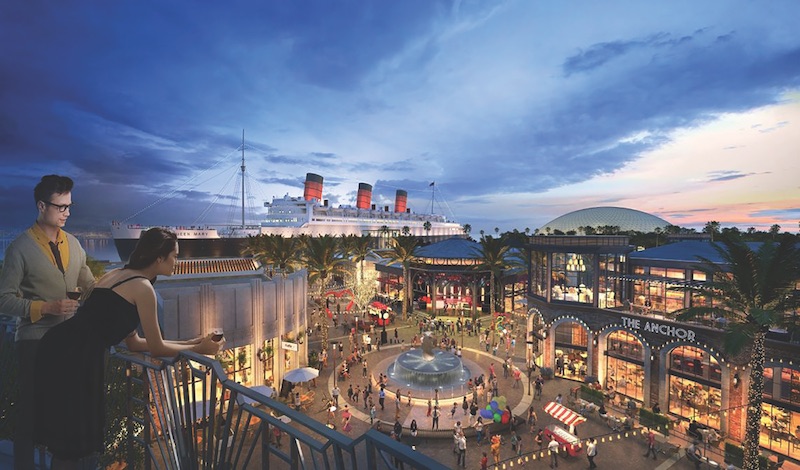 For the redevelopment of Queen Mary Island in Long Beach, Calif., Gensler is considering features such as drive-through walls of video screens that could project images to whet guests’ appetites for the experiences inside. A/V could be used throughout the property, which is a hotel itself, to inform guests about the history of the ship, sea life, and the state.
For the redevelopment of Queen Mary Island in Long Beach, Calif., Gensler is considering features such as drive-through walls of video screens that could project images to whet guests’ appetites for the experiences inside. A/V could be used throughout the property, which is a hotel itself, to inform guests about the history of the ship, sea life, and the state.
4. AI, robots—and human staff—learn from the guests
In the hotel of the future, your phone could be the talisman for the property to monitor your whereabouts and activity on site. Combining real-time data and a database that contains many of your preferences, you might walk up to the pool bar where the bartender would greet you by name and ask if you’d like your favorite drink.
Let’s say you are with a group of college friends. The poolside DJ, being fed information about your group, might be prompted to play tracks hearkening back from your days at State U. The property would compile a detailed digital dossier on guests’ preferences (e.g., Do you prefer hard or soft pillows?) and tailor your experience accordingly. Your social media activity could further inform the hotel’s knowledge of your tastes. That’s the vision, anyway. You have to wonder, though, if hotels go too far, would guests view it as a privacy issue?
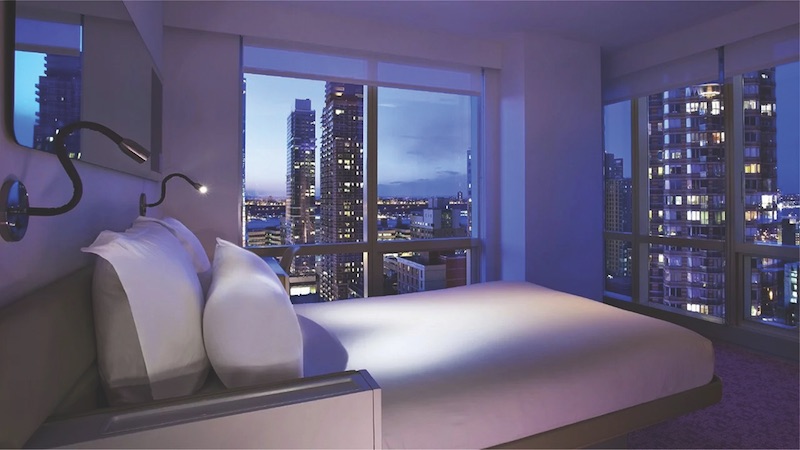 Similar to its locations in Singapore, London, Paris, and Boston, the Yotel in Midtown Manhattan features robotic luggage storage, high-tech micro rooms (170 sf on average), a mobile concierge app, online check-in, space-saving convertible beds, and blazing-fast WiFi. Courtesy Yotel.
Similar to its locations in Singapore, London, Paris, and Boston, the Yotel in Midtown Manhattan features robotic luggage storage, high-tech micro rooms (170 sf on average), a mobile concierge app, online check-in, space-saving convertible beds, and blazing-fast WiFi. Courtesy Yotel.
At least one Hilton Grand Vacations property is already tracking data on how many guests are using various amenities to offer more of things that are most used on the property, says Gensler’s Upchurch.
You might also see robots popping up to do things like deliver room service, assist with check-in, and handle luggage. Automation and robotics, in fact, already run the 100-room Henn-na Hotel in Tokyo, Japan. Human staff is deployed only for emergencies. Guests have described interacting with the robots—some of which take the form of traditional hotel bellhops, others velociraptors and kitschy toy robots—as “like talking to Siri’s younger, dumber sibling.”
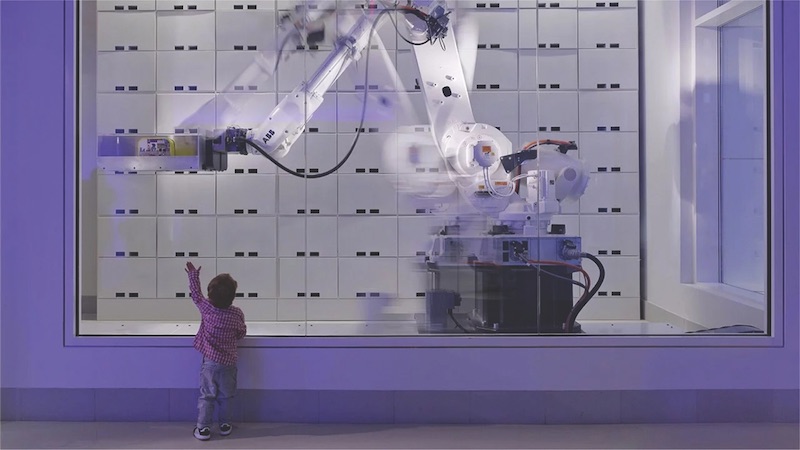 Courtesy Yotel.
Courtesy Yotel.
As hotel executives consider adopting these technologies, there is concern about striking the right balance between digital gizmos and the human touch. According to research by CallisonRTKL, 44% of guests would like to speak to a staff member during check-in, and 60% have more than a few hesitations about staying in a hotel entirely operated by robots.
And what happens when technology breaks down? “Nobody in maintenance can fix a robot at 2 a.m.,” says Marc Ciafardini, Senior Interior Designer with Wilson Associates.
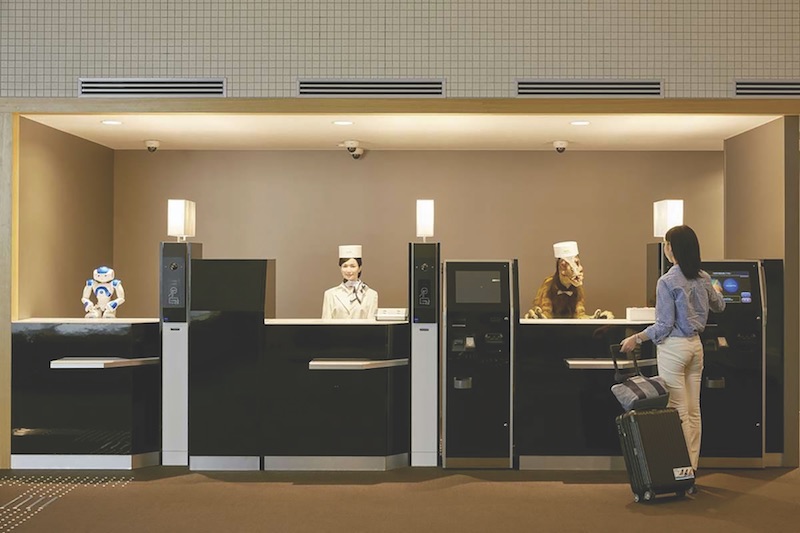 The 100-room Henn-na Hotel in Tokyo, Japan, is almost entirely staffed by robots and automation technology. Human staff is deployed only for emergencies. Its robots take the form of traditional hotel bellhops, velociraptors, and kitschy toy robots. Courtesy Huis Ten Bosch Co.
The 100-room Henn-na Hotel in Tokyo, Japan, is almost entirely staffed by robots and automation technology. Human staff is deployed only for emergencies. Its robots take the form of traditional hotel bellhops, velociraptors, and kitschy toy robots. Courtesy Huis Ten Bosch Co.
5. Building systems “automate” wellness, operational efficiency
Building automation is likely to be used more extensively for improving energy efficiency, enhancing guest wellness initiatives, and simplifying maintenance. At the Omni Frisco (Texas) Hotel, guestrooms are equipped with a kill switch. “When you take your keycard with you and leave the room, an automated switch kills power to the room,” says Ciafardini. This boosts energy efficiency by automatically shutting down lights, TVs, clocks, etc., without depending on human action.
Automation technology that immediately notifies maintenance staff of burned out lightbulbs and other failures could be adopted more widely.
When hotel providers consider automated building systems, there will be more emphasis on wellness, says Basler. Technology will play a greater role not only in controlling lighting levels, but also in air quality and water quality. “Guests want to know what sustainability is doing for them,” says Basler. “People are now more aware of how light and air quality affects them in their workplace and what their carbon footprint is.”
6. Modular construction goes mainstream
Significant changes are on the way in how many hotels are constructed, with entire rooms being fabricated off site. Marriott, for one, has turned to modular largely to enable its ambitious volume of construction—about 1,500 hotel projects in its current pipeline. Concerned that a construction labor shortage could act as a drag on its plans, Marriott sees modular as a key to staying on track.
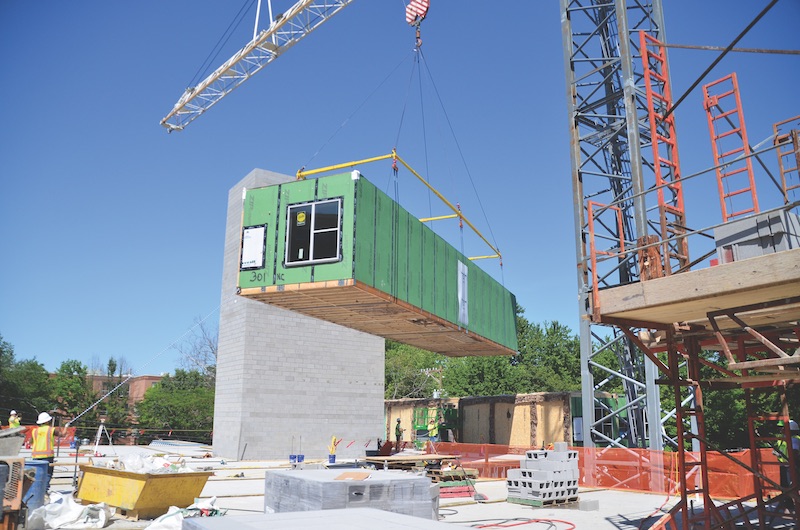 Last fall, Marriott opened its third modular-built hotel, the AC Hotel in Chapel Hill, N.C. The company’s Senior Director of Global Design Strategies, Jennifer Lund, says the process shaved a “couple of months” off the construction schedule compared to a traditionally built property. Marriott International.
Last fall, Marriott opened its third modular-built hotel, the AC Hotel in Chapel Hill, N.C. The company’s Senior Director of Global Design Strategies, Jennifer Lund, says the process shaved a “couple of months” off the construction schedule compared to a traditionally built property. Marriott International.
“We believe at least 40% of our projects could be built modular,” says Jennifer Lund, Senior Director of Global Design Strategies with Marriott. In the fall of 2017, the company opened a modular-built AC Hotel, its third modular project, in Chapel Hill, N.C. The modular process shaved a “couple of months” off the construction schedule compared to a traditionally built property, says Lund. There were other benefits including reduced noise and less disruption to the neighborhood.
“It was a tight, semi-urban location,” says Lund. “The community didn’t want a lot of disruption from construction. By using modular we were able to minimize noise, traffic, and trash.”
Related Stories
| Jan 4, 2011
Grubb & Ellis predicts commercial real estate recovery
Grubb & Ellis Company, a leading real estate services and investment firm, released its 2011 Real Estate Forecast, which foresees the start of a slow recovery in the leasing market for all property types in the coming year.
| Dec 17, 2010
Historic Rhode Island hotel reborn with modern amenities
The iconic Ocean House resort in Watch Hill, R.I., had to be torn down in 2005 when systemic deficiencies made restoration unfeasible. Centerbrook Architects and Planners, Centerbrook, Conn., designed a new version of the hotel, working with preservation societies to save or recreate favorite elements of the original building, and incorporating them into the contemporary structure. The new resort has 49 guest rooms and 23 residences, plus banquet halls, a corporate boardroom, a private clubroom, a spa and fitness center, an indoor lap pool, a bar, and the obligatory international croquet court. Dimeo Construction, Providence, R.I., was the construction manager.
| Dec 17, 2010
Gemstone-inspired design earns India’s first LEED Gold for a hotel
The Park Hotel Hyderabad in Hyderabad, India, was designed by Skidmore, Owings & Merrill to combine inspirations from the region’s jewelry-making traditions with sustainable elements.
| Dec 17, 2010
Vietnam business center will combine office and residential space
The 300,000-sm VietinBank Business Center in Hanoi, Vietnam, designed by Foster + Partners, will have two commercial towers: the first, a 68-story, 362-meter office tower for the international headquarters of VietinBank; the second, a five-star hotel, spa, and serviced apartments. A seven-story podium with conference facilities, retail space, restaurants, and rooftop garden will connect the two towers. Eco-friendly features include using recycled heat from the center’s power plant to provide hot water, and installing water features and plants to improve indoor air quality. Turner Construction Co. is the general contractor.
| Dec 2, 2010
GKV Architects wins best guest room design award for Park Hyatt Istanbul
Gerner Kronick + Valcarcel, Architects, PC won the prestigious Gold Key Award for Excellence in Hospitality Design for best guest room, Park Hyatt Macka Palas, Istanbul, Turkey. Park Hyatt Maçka Palace marries historic and exotic elements with modern and luxurious, creating a unique space perpetuating Istanbul’s current culture. In addition to the façade restoration, GKV Architects designed 85 guestrooms, five penthouse suites, an ultra-hip rooftop bar, and a first-of-its-kind for Istanbul – a steakhouse, for the luxury hotel.
| Nov 16, 2010
CityCenter’s new Harmon Hotel targeted for demolition
MGM Resorts officials want to demolish the unopened 27-story Harmon Hotel—one of the main components of its brand new $8.5 billion CityCenter development in Las Vegas. In 2008, inspectors found structural work on the Harmon didn’t match building plans submitted to the county, with construction issues focused on improperly placed steel reinforcing bar. In January 2009, MGM scrapped the building’s 200 condo units on the upper floors and stopped the tower at 27 stories, focusing on the Harmon having just 400 hotel rooms. With the Lord Norman Foster-designed building mired in litigation, construction has since been halted on the interior, and the blue-glass tower is essentially a 27-story empty shell.
| Nov 3, 2010
Rotating atriums give Riyadh’s first Hilton an unusual twist
Goettsch Partners, in collaboration with Omrania & Associates (architect of record) and David Wrenn Interiors (interior designer), is serving as design architect for the five-star, 900-key Hilton Riyadh.
| Oct 6, 2010
From grocery store to culinary school
A former West Philadelphia supermarket is moving up the food chain, transitioning from grocery store to the Center for Culinary Enterprise, a business culinary training school.
| Sep 30, 2010
Luxury hotels lead industry in green accommodations
Results from the American Hotel & Lodging Association’s 2010 Lodging Survey showed that luxury and upper-upscale hotels are most likely to feature green amenities and earn green certifications. Results were tallied from 8,800 respondents, for a very respectable 18% response rate. Questions focused on 14 green-related categories, including allergy-free rooms, water-saving programs, energy management systems, recycling programs, green certification, and green renovation.


